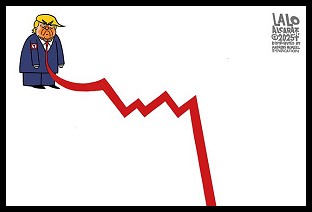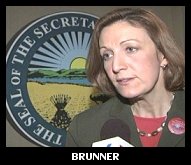-- By Brad Friedman
 In a statement given to the media last week, in response to a federal fraud/false claims act qui tam suit finally unsealed last week, a representative from the defendant, voting machine company, Hart InterCivic, alleged the suit's whistleblower, William Singer, was a "disgruntled employee."
In a statement given to the media last week, in response to a federal fraud/false claims act qui tam suit finally unsealed last week, a representative from the defendant, voting machine company, Hart InterCivic, alleged the suit's whistleblower, William Singer, was a "disgruntled employee."
Employee "Performance Evaluation" records written by company management, included in the complaint itself, however, would seem to strongly contradict the claims of company spokesperson Pete Lichtenheld, as given to a reporter last week.
Additional claims by Lichtenheld, as reported by Kim Zetter at Wired's Threat Level blog on Thursday, are also dispelled by a document from the U.S. Dept. of Justice, obtained by The BRAD BLOG. The DoJ, after requesting and receiving extensions for two years, has finally decided against joining the federal qui tam suit, for the time being, allowing it to become unsealed last week, so that it may now move forward in federal district court.
The lawsuit, posted in full by The BRAD BLOG after it became unsealed last Thursday, details an extraordinary list of fraudulent behavior by Hart InterCivic, as related by one-time employee Singer, who alleges the company deceived Election Officials in Texas, Ohio, Colorado, and elsewhere in hopes of receiving federal monies as distributed via the Help America Vote Act of 2002.
Allegations made in the suit include stunning revelations that Hart failed to test its products properly, and frequently at all, withheld information from prospective clients about the potential loss of votes in its voting systems, dummied-up machines, reports, and test results presented to clients in sales presentations, and much more in an attempt to win state and county contracts.
Much of the response to the suit by company spokesperson Lichtenheld, however, is easily dismissed upon examination of the evidence so far available in the case...


 Trump's FCC on Precipice of Ending All Limits on Corporate Control of Local TV Stations
Trump's FCC on Precipice of Ending All Limits on Corporate Control of Local TV Stations GOP Earth Day 2025 Hypocrisies and Dilemmas: 'BradCast' 4/22/25
GOP Earth Day 2025 Hypocrisies and Dilemmas: 'BradCast' 4/22/25 'Green News Report' 4/22/25
'Green News Report' 4/22/25
 Pope Francis Dies,
Pope Francis Dies, Sunday
Sunday  Sunday 'Zero Day' Toons
Sunday 'Zero Day' Toons Soc. Sec. Expert Warns DOGE Hastening Collapse, Privati-zation: 'BradCast' 4/10/2025
Soc. Sec. Expert Warns DOGE Hastening Collapse, Privati-zation: 'BradCast' 4/10/2025 'Green News Report' 4/10/25
'Green News Report' 4/10/25 Trump Blinks, Chaos Reigns, Markets Spike as Many Tariffs Remain Despite 90-Day 'Pause': 'BradCast' 4/9/25
Trump Blinks, Chaos Reigns, Markets Spike as Many Tariffs Remain Despite 90-Day 'Pause': 'BradCast' 4/9/25 SCOTUS Deportation Ruling Grimmer Than First Appears: 'BradCast' 4/8/25
SCOTUS Deportation Ruling Grimmer Than First Appears: 'BradCast' 4/8/25 'Green News Report' 4/8/25
'Green News Report' 4/8/25 Cliff Diving with Donald: 'BradCast' 4/7/25
Cliff Diving with Donald: 'BradCast' 4/7/25 Sunday 'Don't Look Down' Toons
Sunday 'Don't Look Down' Toons 'Green News Report' 4/3/25
'Green News Report' 4/3/25 'Mob Boss' Trump's Trade Sanctions Tank U.S., World Markets: 'BradCast' 4/3/25
'Mob Boss' Trump's Trade Sanctions Tank U.S., World Markets: 'BradCast' 4/3/25 Crawford Landslide in WI; Booker Makes History in U.S. Senate: 'BradCast' 4/2/25
Crawford Landslide in WI; Booker Makes History in U.S. Senate: 'BradCast' 4/2/25 Judge Ends Challenge to GA's Unverifiable, Insecure Vote System: 'BradCast' 4/1/25
Judge Ends Challenge to GA's Unverifiable, Insecure Vote System: 'BradCast' 4/1/25 Bad Court, Election News for Trump is Good News for U.S.: 'BradCast' 3/31
Bad Court, Election News for Trump is Good News for U.S.: 'BradCast' 3/31 Vets Push Back at Plan to Slash Health Care, 80K V.A. Jobs: 'BradCast' 3/27/25
Vets Push Back at Plan to Slash Health Care, 80K V.A. Jobs: 'BradCast' 3/27/25 Signal Scandal Worsens for Trump, GOP; Big Dem Election Wins in PA: 'BradCast' 3/26
Signal Scandal Worsens for Trump, GOP; Big Dem Election Wins in PA: 'BradCast' 3/26 'Emptywheel': Trump NatSec Team Should 'Resign in Disgrace': 'BradCast' 3/25/25
'Emptywheel': Trump NatSec Team Should 'Resign in Disgrace': 'BradCast' 3/25/25 USPS 'Belongs to the People, Not the Billionaires': 'BradCast' 3/24/25
USPS 'Belongs to the People, Not the Billionaires': 'BradCast' 3/24/25
 VA GOP VOTER REG FRAUDSTER OFF HOOK
VA GOP VOTER REG FRAUDSTER OFF HOOK Criminal GOP Voter Registration Fraud Probe Expanding in VA
Criminal GOP Voter Registration Fraud Probe Expanding in VA DOJ PROBE SOUGHT AFTER VA ARREST
DOJ PROBE SOUGHT AFTER VA ARREST Arrest in VA: GOP Voter Reg Scandal Widens
Arrest in VA: GOP Voter Reg Scandal Widens ALL TOGETHER: ROVE, SPROUL, KOCHS, RNC
ALL TOGETHER: ROVE, SPROUL, KOCHS, RNC LATimes: RNC's 'Fired' Sproul Working for Repubs in 'as Many as 30 States'
LATimes: RNC's 'Fired' Sproul Working for Repubs in 'as Many as 30 States' 'Fired' Sproul Group 'Cloned', Still Working for Republicans in At Least 10 States
'Fired' Sproul Group 'Cloned', Still Working for Republicans in At Least 10 States FINALLY: FOX ON GOP REG FRAUD SCANDAL
FINALLY: FOX ON GOP REG FRAUD SCANDAL COLORADO FOLLOWS FLORIDA WITH GOP CRIMINAL INVESTIGATION
COLORADO FOLLOWS FLORIDA WITH GOP CRIMINAL INVESTIGATION CRIMINAL PROBE LAUNCHED INTO GOP VOTER REGISTRATION FRAUD SCANDAL IN FL
CRIMINAL PROBE LAUNCHED INTO GOP VOTER REGISTRATION FRAUD SCANDAL IN FL Brad Breaks PA Photo ID & GOP Registration Fraud Scandal News on Hartmann TV
Brad Breaks PA Photo ID & GOP Registration Fraud Scandal News on Hartmann TV  CAUGHT ON TAPE: COORDINATED NATIONWIDE GOP VOTER REG SCAM
CAUGHT ON TAPE: COORDINATED NATIONWIDE GOP VOTER REG SCAM CRIMINAL ELECTION FRAUD COMPLAINT FILED AGAINST GOP 'FRAUD' FIRM
CRIMINAL ELECTION FRAUD COMPLAINT FILED AGAINST GOP 'FRAUD' FIRM RICK SCOTT GETS ROLLED IN GOP REGISTRATION FRAUD SCANDAL
RICK SCOTT GETS ROLLED IN GOP REGISTRATION FRAUD SCANDAL VIDEO: Brad Breaks GOP Reg Fraud Scandal on Hartmann TV
VIDEO: Brad Breaks GOP Reg Fraud Scandal on Hartmann TV RNC FIRES NATIONAL VOTER REGISTRATION FIRM FOR FRAUD
RNC FIRES NATIONAL VOTER REGISTRATION FIRM FOR FRAUD EXCLUSIVE: Intvw w/ FL Official Who First Discovered GOP Reg Fraud
EXCLUSIVE: Intvw w/ FL Official Who First Discovered GOP Reg Fraud GOP REGISTRATION FRAUD FOUND IN FL
GOP REGISTRATION FRAUD FOUND IN FL



















 The declaration was created as several of us determined it would be helpful to define the cause as specifically and directly as possible. Once it was finalized, I signed it first, in large letters, as the Hancock legend goes, "so that King George can read it without his glasses."
The declaration was created as several of us determined it would be helpful to define the cause as specifically and directly as possible. Once it was finalized, I signed it first, in large letters, as the Hancock legend goes, "so that King George can read it without his glasses."
 It should be an interesting afternoon. I'll be speaking on a panel titled "Have the media undermined our democracy?" tomorrow (Saturday) at CA Common Cause's "L.A. Media Reform Summit" in Pasadena.
It should be an interesting afternoon. I'll be speaking on a panel titled "Have the media undermined our democracy?" tomorrow (Saturday) at CA Common Cause's "L.A. Media Reform Summit" in Pasadena.
 "The most serious thing any software company can do is not fully test its products," William Singer told
"The most serious thing any software company can do is not fully test its products," William Singer told  "[T]he role of advocate is, no matter what kind of information comes out, to sort of disparage it, and, you know, they’re fighting for a result, not the truth. And they already think they know the truth..."
"[T]he role of advocate is, no matter what kind of information comes out, to sort of disparage it, and, you know, they’re fighting for a result, not the truth. And they already think they know the truth..." The good folks at L.A.'s Pacifica Radio affiliate,
The good folks at L.A.'s Pacifica Radio affiliate,  Last week, in the wake of their AVC Advantage touch-screen voting systems having been found to have
Last week, in the wake of their AVC Advantage touch-screen voting systems having been found to have  Ohio's Secretary of State Jennifer Brunner is planning "a first-of-its-kind audit of votes from the March 4 presidential primaries, saying the outcome should help ensure the integrity of future elections," according to
Ohio's Secretary of State Jennifer Brunner is planning "a first-of-its-kind audit of votes from the March 4 presidential primaries, saying the outcome should help ensure the integrity of future elections," according to  After a week of being told how the situation has "improved" in Iraq --- with a compliant corporate media, as usual,
After a week of being told how the situation has "improved" in Iraq --- with a compliant corporate media, as usual, 
 We can't think of a clever enough turn of phrase this morning to adequately cover the full irony here...
We can't think of a clever enough turn of phrase this morning to adequately cover the full irony here... 













